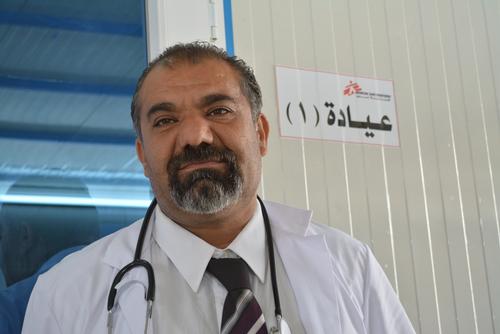Muhammed, a general surgeon from Qamishli, had been working in Al-Safirah district, in Aleppo governorate, since 2006. He worked at a government hospital in the morning and at his private clinic in the evening.
“Before 2011, life was happy and work was good. I would work hard and after work I would enjoy visiting friends all around Aleppo.”
Clinic in the midst of battle
But when conflict started in rural Aleppo, Muhammed found himself and his clinic in the midst of battle. “My clinic was situated in the vicinity of three strategic positions which were being fought over by multiple groups. I was stuck for eight months, unable to leave my clinic for Aleppo or anywhere else, and there were snipers all around.
“When Al-Safirah was attacked with barrel bombs there were body parts and blood all over the streets. I would work into the night.Vegetable carts piled full of men, women and children would arrive at my clinic – some with their hands gone, their legs gone, their eyes gone. We had very basic surgical capabilities, no general anesthetic, and we were just three doctors – myself and two paediatricians – but the neighbours were very helpful.”
'We escaped as the bombs were falling'
With fighting continuing every day, there was a large exodus of people leaving Al-Safirah. Muhammed managed to escape with his life, under fire. “We escaped as the bombs were falling. That day, my clinic was hit and destroyed.
“I retreated 12km away from the town and set up a small field hospital. Although we had a good supply of medicine and equipment, I was the only doctor. There were no nurses, only the youth among the neighbours helping. We worked hard, but there was fighting and kidnapping on the ground, and barrel bombs falling from the sky. We were caught between two fires.
Threat of kidnapping
“I promised myself to continue working and stay until the end. I was not fearing the planes, but I was the only Kurd in the area, and Kurds were being targeted.”
Muhammed decided to leave in January 2014, as the threat of kidnapping was becoming too great. And once again he left just in time. “The morning after I left, barrel bombs were dropped on the field hospital. The whole place was destroyed. The medicines in it would have been enough to equip a full hospital.”
Long and perilous journey
He recalls a long and perilous journey through Ar-Raqqah and Al-Hasakah, passing numerous checkpoints in which he had to hide his Kurdish identity, until he reached the town of Qamishli. From there, he tried to cross the border to Iraq three times, but it was closed. He had to endure an 11 hour journey on foot through mountains and valleys from Qamishli to another part of the border, where he was finally able to leave Syria.
After settling in Darashakran refugee camp, Muhammed was struggling to continue practicing as a doctor. He worked as a painter for two weeks in the camp. Then one day, while walking in the camp feeling depressed, things changed for him. “I had lost hope. I was thinking about my next painting job when I came across some MSF expat staff in the camp by chance. They told me there was an opening in Kawargosk camp and that I could apply. I had heard about MSF before, and had dreamt of working with them in the past.”
'Work is good'
After a written test and interview, Muhammed began work as a general doctor for MSF in Kawargosk camp. “Work is good,” he says. “I’m very happy to be working in my field, with all my energy. The people here are happy with our service, especially that I share their language and dialect. I know about their suffering and their way of thinking. Sometimes the only treatment they need is through words, not drugs.”
Muhammed still lives in Darashakran camp, commuting every day to Kawargosk camp, ten kilometres away. Despite escaping with his life on two occasions, and continuing to provide medical care to his fellow Syrian refugees, Muhammed still struggles with his conscience. “Even till this moment I have feelings of guilt that I left Syria. Working with MSF here is some consolation, but sometimes I tell myself that I should have served my people better and stayed even if I was killed. Maybe I could have fulfilled my duty better.
“My wish is for the crisis to be solved as soon as possible and for the people to return home.”



